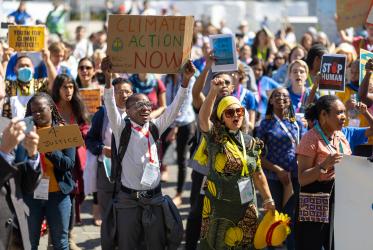We came from countries across Europe and North America to learn, grow, and act for climate justice at the latest World Council of Churches Eco School Program, held in Crete, Greece. What I appreciate most about programs like this is that we learn just as much from the instructors as we do from the other participants. Hearing about their country’s political contexts, their church movements, and their personal experiences was incredibly valuable. This strengthened our ecumenical bonds, our international understandings, and our resolve to create a more just, green, and caring world.
It was illuminating to engage the joint nexus of climate, health, food, and water issues – to recognize that these must be addressed holistically and simultaneously. We need not fear that our efforts would be somehow diluted if we focus on all these issues together – as though working on water rights somehow takes away from healing the climate – but rather, we recognize that the very same socio-political-economic systems and actors that damage our climate, also damage our health, our food, and our water. And so, in addressing the root causes of these issues through rights-based advocacy, we can create a better world that respects each other and creation. As eco ambassadors from the Global North, whose countries have historically contributed the most to these issues, and have more resources to address them, it is our undeniable obligation to bring about change. As Christians, it is our God-given duty.
Likewise, it was good to experience ecumenism in action. We hailed from different denominations, ascribed to different theologies, and held different politics – but we were all united in our desire to address environmental injustices. Of course, the differences aren’t to be waived away - rather, we can take a lesson from the emphasis of dialogue missioned by the Orthodox Academy of Crete, where the Eco School was held. Dialogue that honours the other is necessary for co-existence and cooperation on areas of agreement: answering God’s call to feed the poor, heal the sick, and take care of creation.
One humorous and good-natured disagreement occurred between me, a participant from Canada, and two participants from Finland. The unbridgeable feud? Whether Santa Claus lives in Finland or Canada. This and other fun exchanges occurred during our cultural night, where participants dressed in their traditional garb, brought food from their country, and shared songs and dances. This was certainly a highlight of our time.
As we presently engage in COP28, a conference that has been infiltrated by the very corporate fossil fuel and complicit government actors whose collective damage the summit was made to address – it more important than ever for churches and Christians around the world to speak truth to power, demand action, and do justice.
The United Church of Canada is strong proponent of ecumenical environmental initiatives, and I was glad to participate in the World Council of Churches Eco School. I wish to thank our coordinator, Dinesh Suna, and all who contributed and supported the program. Likewise, I’m grateful for the exemplary hospitality of the Orthodox Academy of Crete. Finally, I extend my deep appreciation for my Eco School colleagues from North America and Europe for their wisdom, warmth, and fellowship. As we say in the ecumenical movement – it’s not goodbye, just see you later. We will meet again.





